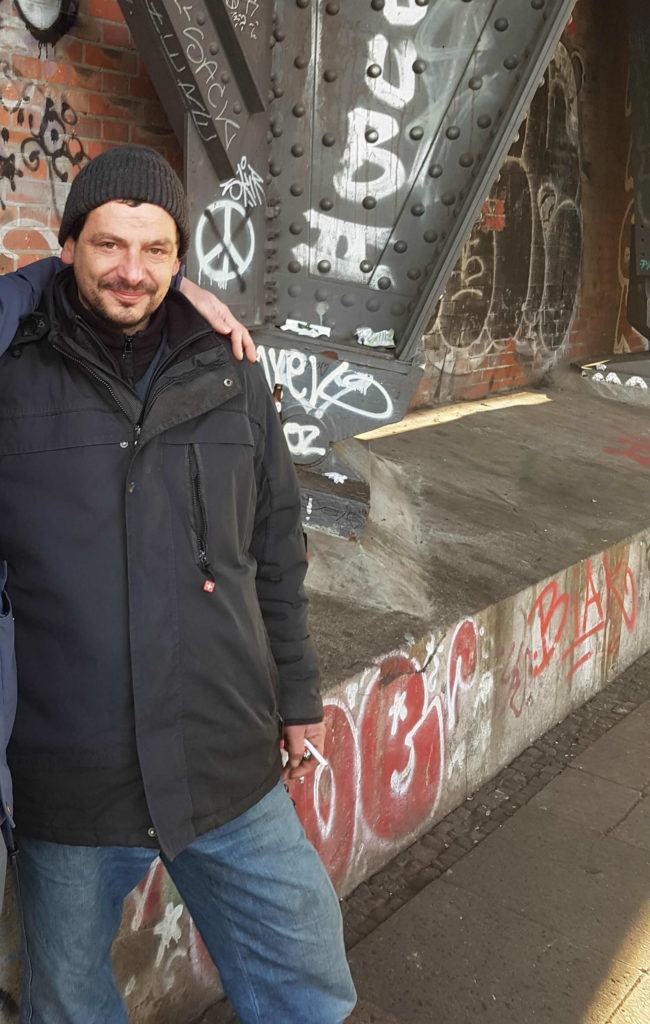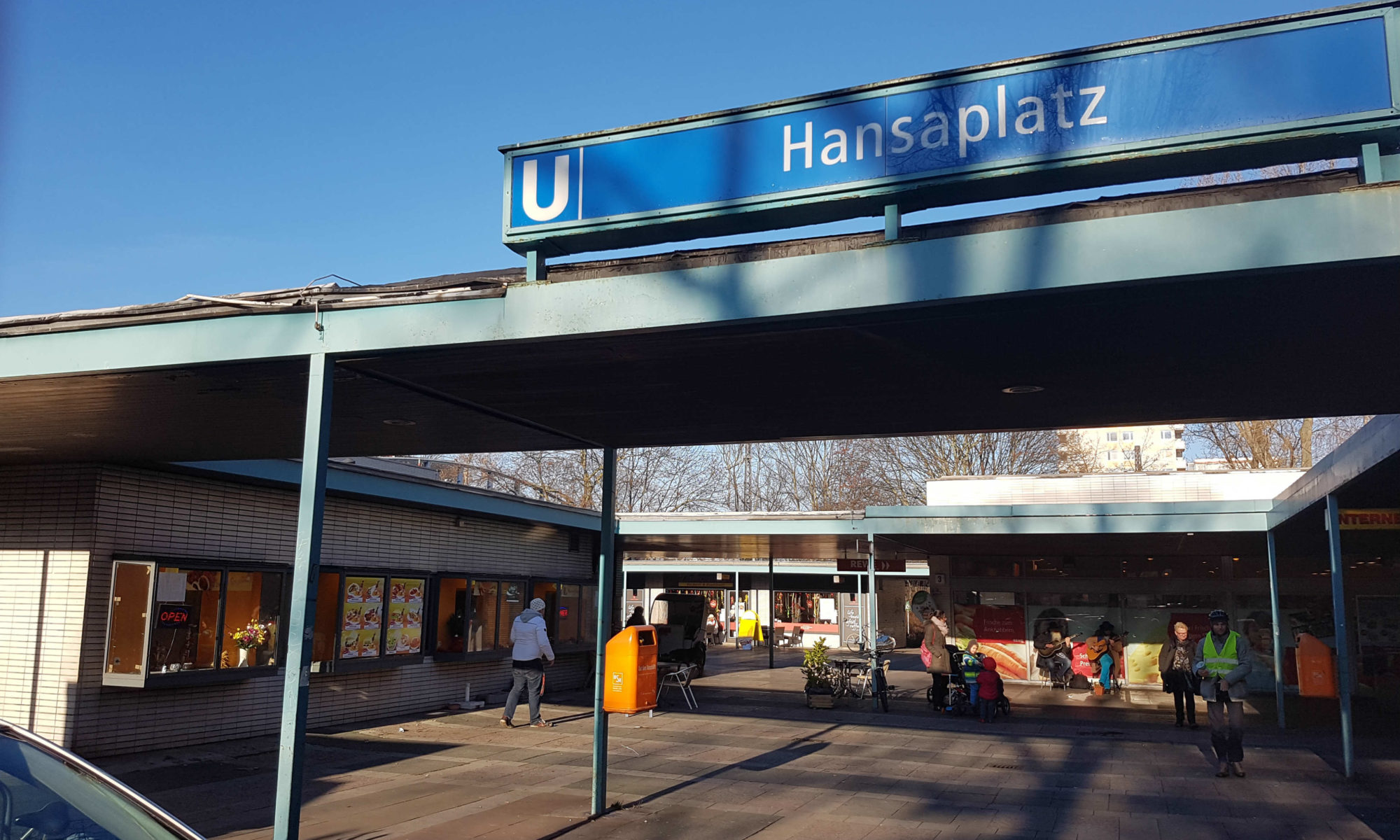Lennart Richter
Rosemarie Emmler (89) is a first tenant in an apartment in Hansaviertel, an area once considered to be upper class.
After being nearly completely destroyed during World War II., ambitious Bauhaus-Projects were realized here in the sixties.
Hansaviertel represented a new Berlin. Inmidst of nature, surrounded by the Tiergarten and in immediate proximity to the Spree, people were living isolated from the hustle and bustle of the big city for a long time. But during the last couple of years, the quarter has noticably changed:
“We were very happy when we first were accepted for buying an apartment here. But that was a long time ago. The Hansaplatz is not what it used to be.“
Back in the day there were a lot of small shops and even a cableway, but nowadays the Hansaplatz is mainly dominated by a cornershop. “It’s dirty everywhere and people are afraid to go outside after sundown.“ The Hansaplatz is inhabited by dubious persons, rumours of thievery and burglary are going round, she says. “It’s all the fault of the Homeless.“, complains Mr Thuy (32), one of Mrs. Emmler’s neighbors.
“They are urinating in the entrances, relieving themselves in hallways. I heard, they even are eating the swans now. Something has to be done about this.“ Mrs. Emmler nods as she has heard of this too.
Still she says: “Well, they have to go somewhere. But at least some public toilets would be in order.“ The tense situation seems to be also known to the officials responsible.
Thomas Isenberg, whose office is located directly at Hansaplatz, is sitting in the Berlin Parliament for the SPD and regularly hosts civil dialogues with the topic: “Security and cleanliness in Hansaviertel“. He’s openly addressing the increasing dereliction in the area:
“According to recent estimates, Berlin has seen an increase of 800 Homeless people in 2016 alone, many coming from Eastern Europe and the Balkan States. Tiergarten and the area around the Hansaplatz developed into some kind of meeting place for the Homeless. This situation is significantly burdening the residents.“
He says it has become grimy everywhere and ciminal incidents, especially those related to drug use and -trafficking, have increased. To steer the quarter back in a positive direction, a dialogue between all parties would be necessary:
“It is important to provide help for both sides – that’s why more presence of the police and the municipal office of public order, aswell as social workers is needed.“
Berlin has a general problem with an increasing number of Homeless people indeed. Estimates of social organisations are putting the figures between 3.000 and 10.000, the social administration of of Berlin is not gathering official figures. Especially Tiergarten provides many advantages for homeless people due to it’s vastness and the proximity to the Bahnhofsmission and the Caritas.
Just recently a “wild camp“ in the Tiergarten was dissolved by the police with prominent accompaniment of district mayor Stephan von Dassel (Bündnis90/Die Grünen), who gave “Pollution“ and the “Killing of park animals“ as reasons, according to the Tagesspiegel.
And although the pollution caused by the homeless is clearly visible everywhere around Hansaviertel, the often deplored criminality seems to be more of a feeling than the factual truth:
“We could absolutely not find an increase of criminality rates in Hansaviertel during the last years. Actually, the former Status of a High-Crime-Level-Area that was in place because of drug-related criminality around the subway station, was lifted in the first quarter of 2016 because the numbers did not justify it anymore.“ said Mario Kanisch, Police Commisioner and Head of the second service group of Police Station 34.
Nonetheless many residents are worried. In the district, where „Merkel must go“ is written on every second corner, some are growingly giving vent to their frustration: “An aggressive mood is prevailing around here.“, says Martha Wegewitz, board member of the Berliner Obdachlosenhilfe e.V.
The social club used to organize a soup kitchen at Hansaplatz every sunday, where their volunteers often were insulted by residents, sometimes even threatened: “Once an elderly man came by with a camera. He documented everything we did and threatened to come back with at least ten of his friends unless we got out of there immediately.“.
About the alleged origin of the homeless she says: „In Berlin, there are many people without a place to live coming from other EU-countries, mostly from Poland. But the bigger share of homeless people from Berlin are still coming from germany.“ .
Where all the hostility is coming from, Ms. Wegewitz can’t explain.
That’s why she is thankful for constructive proposals from residents like Mrs. Emmler, although she doesn’t see much chances for public toilets: “They are searching for a fast and final solution. Follwing the logic of the responsible officials, such measures would only attract more homeless people“. With the coming of the new year, the clubs allowance to serve food at Hansaplatz has been revoked by the local supermarket.
According to Mrs. Wegewitz, this is not the first sign that homeless people aren’t welcome in Hansaviertel anymore. At the first of Thomas Isenberg’s civil dialogues, members of the club were invited to represent the point of view of the homeless. Although they gladly offered to speak again at the second dialogue, they were explicitly only welcomed as spectators.
Mrs. Wegewitz says, Thomas Isenberg and his employee Marlon Bünk are doing everything so that until the upcoming sixtiest anniversary of the world cultural heritage Hansaviertel is held, even the last homeless disappears: “Mr. Isenberg wants, that the shops around the Hansaplatz stop selling to homeless people and that residents complain to the police about trifles so that the status of a High-Crime-Level-Area is reintroduced. He is bothered by our soupkitchen aswell – his concept is based on trying to solve social and political issues with the police.“
Instead of more police presence, she is promoting a neighborhood service, where residents voluntarily act as mediators between other residents and the homeless. “This is the only way to ensure that on the long term, both parties can live peacefully, side-by-side. What many tend to forget: Not having a home does not mean to have less rights.“
Another person that wants everyone in Hansaviertel to get along is Salvatore (44).

He is homeless and has been living around the area for seven years now: „There are the good guys and the bad guys.“. At the moment, he is camping under a brigde behind a supermarket. On Hansaplatz he received a dismissal from the police, as many of his friends did too. “We’re humans too. Of course the residents think it sucks when people are polluting everything. But me for example, I sweep my part of the street every day. Since I’m here, it has become cleaner than before.“.
Nevertheless he is subject to a broad variety of animosities. Residents are insulting him, one of the shop owners supposedly hit him several times with a stick. The police used to tolerate homeless people in the quarter, but he has been feeling picked on for some time now:
“They come around because of nothing. Some assholes call in, then the police comes and hassles us. In the end, they always have to leave because we didn’t do nothing.“ . And anyway, times would have changed at Hansaplatz: “This used to be a proper place where everybody could live. That’s why we all know each other. But by now everyone is against us, nobody is selling us anything except for the cornershop and even the subway station is now closed during the winter.“
The upcoming anniversary was news for him. In fact he says, Thomas Isenberg has never spoken to him or one of his „Brahs“ so far, as he calls his fellow companions. But he is not in fear of being driven out of the district anyway:
„Here are the Zoo and the Tiergarten. Sex, Drugs and Rock and Roll. They will never succeed to get rid of the people here, they will always come back.“

